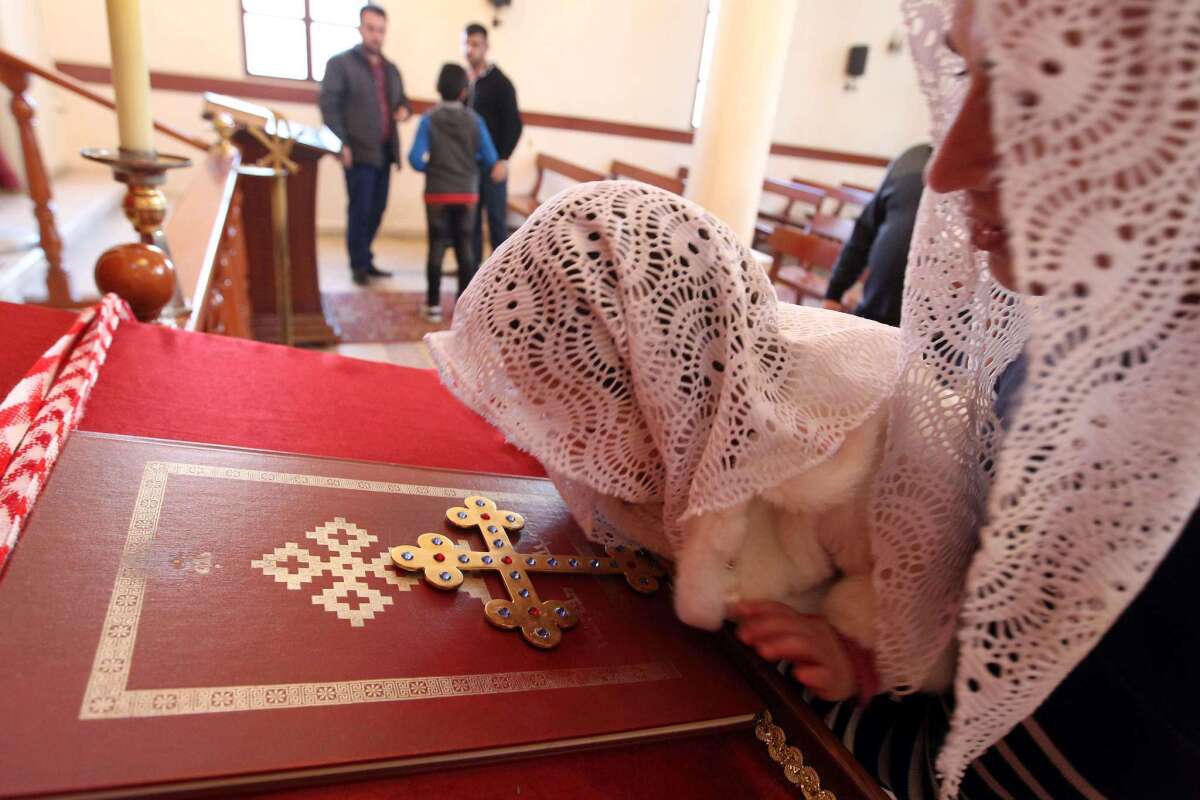Relatives await word on Assyrians abducted by Islamic State in Syria

- Share via
George Kasten learned the frightening news online: Assyrian Christian villages in northeastern Syria had been attacked, possibly by Islamic State extremists.
The 26-year-old high school English teacher, who lives near Stockholm, has extended family in Tel Shamiram, a village on the banks of the Khabur River. He had to make sure they were OK.
Kasten and his mother called a relative in Beirut hoping to hear reassuring news about the Monday morning attacks in the Syrian villages.
The relative, Kasten’s mother’s cousin, told them she had gotten a call from an elderly relative in Tel Shamiram, saying that members of Islamic State had gone to the family’s home before dawn and asked whether he and his family were Christians. When they said yes, most of the family members were taken to another house. He didn’t know where they had gone.
That evening, Kasten and his mother heard back from their relative in Lebanon. She had been calling her father in Tel Shamiram again and again to check on his safety, but he never responded. Eventually, she said, someone answered the phone.
“Don’t call anymore,” said the unknown man, identifying himself as a member of Islamic State. “We have everyone. Stop calling.”
Kasten said many members of his extended family, including women and children, were abducted.
At least 220 people have been abducted since Monday, when Islamic State militants attacked 11 mostly Assyrian Christian villages near the town of Tal Tamir as part of a targeted raid, activists said. There was no definitive word of their whereabouts by late Friday.
Among the kidnapped are a large number of women, children and elderly people, according to the U.S. Department of State.
Hundreds of families from the 11 villages were forced to flee to churches or empty houses in Hassake and Qamishli, or to other villages across the Khabur River, said Robert Gabriel, a representative of the American Syriac Union, a nonprofit organization based in New Jersey, and a spokesman for the Syriac Military Council, a Christian militia.
Many people left their homes with just the clothes on their backs, according to A Demand for Action, an activist group that focuses on religious minorities in the Middle East.
Churches, including one of the oldest in the village of Tel Hormuz, were burned down, as well as dozens of homes, the group said in a Facebook post.
Gabriel said that in some places, Syriac Military Council units fought Islamic State militants, giving some villagers the chance to escape. Kurdish forces joined those of the Syriac Military Council to fight against Islamic State, also known by the acronyms ISIS or ISIL, he said.
The attacks on the villages added to the many acts of violence tied to Islamic State, which this month released video of the beheading of 21 Egyptian Christians seized in Libya.
Gabriel said the number of kidnapped Assyrians was first estimated at 90, but increased in subsequent days based on information from relatives of the missing.
Three weeks ago, Islamic State members ordered residents in the Hassake region to remove crosses from their churches and pay a fee for being Christian. Residents refused and that may be why the villages were targeted, Gabriel said.
Kasten said he and other relatives of the kidnapping victims have heard conflicting reports about where their loved ones might have been taken, increasing their fear.
“The problem is that we’ve heard so much news from all over the place, and we don’t know what is true and what is not,” Kasten said. “We don’t really know what’s happening.”
Some reports have named Abdul Aziz mountain, or other nearby towns, as possible locations where the people may have been taken.
If a location can be confirmed, a rescue might be attempted, Gabriel said.
Kasten was not as hopeful.
“I don’t think anyone will survive,” he said. “If you follow the pattern of ISIL, they don’t release any hostages.”
Nicholas al Jeloo, 31, first learned of the kidnappings via email and said he initially thought his family in the village of Tel Goran was safe. His cousin told him the family was taken in by an Arab family and was fine. Then Al Jeloo learned that his grandfather’s cousin and the grandfather’s cousin’s son had been kidnapped.
“This is genocide,” said Al Jeloo, a researcher at the University of Melbourne, Australia. “They’re not just losing their lives because of their religion. They’re also losing their culture and their tradition and their link to the land, which they have inhabited for thousands of years.”
His grandfather’s cousin is about 90 and has had multiple strokes, making it difficult for him to speak and move. His grandfather’s cousin’s son lives in a mud-brick home.
“These are people with no money,” Al Jeloo said. “These are people with a very rural life, very meager existence, and they’re being picked on, and they’re pawns in this international war.”
Kasten said he and his family have done what they can this week: They sent money to a Syrian charity to support refugees fleeing from Islamic State and they have constantly checked news reports for updates.
“My mother hasn’t stopped crying, and my aunt also,” he said. “They don’t know what to do. We feel so helpless.”
Twitter: @smasunaga
More to Read
Sign up for Essential California
The most important California stories and recommendations in your inbox every morning.
You may occasionally receive promotional content from the Los Angeles Times.














